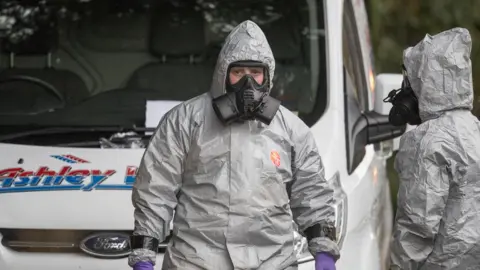Navalny 'poisoned': What are Novichok agents and what do they do?
The German government says Russia's opposition leader, Alexei Navalny, has been poisoned with a Novichok nerve agent.
The most prominent critic of Russian President Vladimir Putin was airlifted to Berlin for treatment after falling ill during a flight in Russia's Siberia region last month. He has been in a coma since.
The name Novichok last made news in 2018, when Russian ex-spy Sergei Skripal and his daughter Yulia were attacked in the city of Salisbury in the UK.
Russia has denied any role in Mr Navalny's predicament - or the Skripals' poisoning.
So what do we know about this group of military-grade nerve agents?
They were developed in the Soviet Union
The name Novichok means "newcomer" in Russian, and applies to a group of advanced nerve agents developed by the Soviet Union in the 1970s and 1980s.
They were known as fourth-generation chemical weapons and were developed under a Soviet programme codenamed Foliant.
Novichok's existence was revealed by chemist Dr Vil Mirzayanov in the 1990s, via Russian media. He later defected to the US, where he published the chemical formula in his book, State Secrets.
 Reuters
ReutersAccording to Dr Mirzayanov, the Soviets used the plant to produce and test small batches of Novichok. These nerve agents were designed to escape detection by international inspectors.
They are more toxic than other agents
Some variants of Novichok are thought to be five to eight times more toxic than the VX nerve agent.
"This is a more dangerous and sophisticated agent than sarin or VX and is harder to identify," says Professor Gary Stephens, a pharmacology expert at the University of Reading.
VX agent was the chemical used to kill the half-brother of Kim Jong-un in 2017, according to the US.
How long does Novichok last?
Experts are divided on how long the nerve agent remains toxic.
Dr Mirzayanov says it does not last for months.
But Vladimir Uglev, a scientist who claims he invented the Novichok agent used in the Skripals' poisoning, says the substance is "very stable".
Other experts say the chemicals are designed to be persistent and could last for months or years, particularly if they were kept in containers.
"They [Novichok nerve agents] don't evaporate, they don't break up in water," said Andrea Sella, professor of inorganic chemistry at University College London.
One difficulty is that Novichok is less well studied and understood than other nerve agents, and there is no official scientific data on how long they last.
Novichoks exist in various forms
While some Novichok agents are liquids, others are thought to exist in solid form. This means they could be dispersed as an ultra-fine powder.
Some of the agents are also reported to be "binary weapons", meaning the nerve agent is typically stored as two less toxic chemical ingredients that are easier to transport, handle and store.
 Getty Images
Getty ImagesWhen these are mixed, they react to produce the active toxic agent.
"One of the main reasons these agents are developed is because their component parts are not on the banned list," says Prof Stephens.
Some can take effect very quickly
Novichoks were designed to be more toxic than other chemical weapons, so some versions would begin to take effect rapidly - in the order of 30 seconds to two minutes.
The main route of exposure is likely to be through inhalation or ingestion, though they could also be absorbed through the skin.
The symptoms are similar to those of other nerve agents
Novichok agents have similar effects to other nerve agents - they act by blocking messages from the nerves to the muscles, causing a collapse of many bodily functions.
Dr Mirzayanov said the first sign to look out for was miosis, the excessive constriction of the pupils.
A larger dose could cause convulsions and interrupted breathing, he said.
"[Then begins the] continuous convulsions and vomiting, and then a fatal outcome."


Dr Mirzayanov said there were antidotes - atropine and athene - that helped stop the action of the poison, but that they were not a cure.
If a person is exposed to the nerve agent, their clothing should be removed and their skin washed with soap and water. Their eyes should be rinsed and they should be given oxygen.
Could anyone else have made Novichok agents?
Dr Mirzayanov believes Russia had to have been behind the Skripal poisoning "because Russia is the country that invented it, has the experience, turned it into a weapon... has fully mastered the cycle".
Russia's UN ambassador has said development work on Soviet-era nerve agents stopped in 1992, and that existing stockpiles were destroyed in 2017.
In September 2017, the Organisation for the Prohibition of Chemical Weapons (OPCW) confirmed the full destruction of the 39,967 metric tons of chemical weapons possessed by Russia.
But Novichoks were never declared to the OPCW, and the chemicals never formed part of any control regime partly because of uncertainty about their chemical structures, says Prof Alastair Hay at the University of Leeds.
It is quite likely that some government laboratories made minute quantities and stored their characteristics in databases, so that their identity could be confirmed at a later stage if found as an unknown poison in someone's blood, he said.
